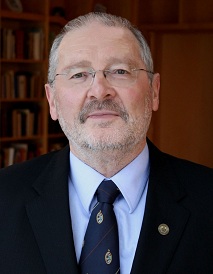‘Never stop learning’
Outgoing Vice-Provost (Integrated Planning and Academic Programs) Dr. David Collins reflects on his time in this role
At the end of June, Dr. David Collins is stepping down from being Vice-Provost, Integrated Planning and Academic Programs, to return to the College of Pharmacy in the Rady Faculty of Health Sciences. UM Today caught up with Dr. Collins to reflect on his time in the position.

Dr. David Collins
When did you start at the University of Manitoba?
I took over the deanship of the Faculty of Pharmacy, which at that time was located beside the Fitzgerald building and was responsible for building a new home on the Bannatyne campus. Joanne Keselman, former Provost and Vice-President (Academic) recruited me to my current position, and I’ve been here since 2010.
What are you most proud moments as Vice-Provost, Integrated Planning and Academic Programs?
That’s a difficult question as it’s such a very broad portfolio. But I guess if I had to pick anything that would be: to get anything done in such a complex organization, you need really good people—you need a good team that can support you in your role, provide you the sort of advice you need to be successful, and to form connections of their own throughout the university. I think my proudest achievement is being fortunate enough to attract a couple of people who are just stellar. And that benefited me in my role, and certainly benefited the university from what they bring to their positions. And that would be people like Cassie Davison, academic programs specialist, for instance. A phenomenal team, and I’m going to miss them daily.
It’s easy to get the sense it’s a real team working here.
It’s all about the people. We’re a large, complex institution. We do a lot of things, but we do it all with people–we affect change, and we make progress through people. Being able to attract the right people, and to help them grow and develop and make the best of opportunities that are available is really critical. My successes are because of my people, my failures are because they couldn’t convince me otherwise (laughs).
What would you say the biggest takeaway you’ve experienced on campus?
My title, which has changed a couple of times, was Vice-Provost (Academic Programs). The integrated planning piece has been added, because in order to meet the objectives of a portfolio that crosses all of our academic programs, as mine does, and act as another face with government, and actually playing a major involvement and the introduction and running of the new budget model, you need to integrate efforts between multiple departments and people. You’ve got to have the right people in place, and you’ve got to have the processes that allow them to integrate and work effectively.
Too often we create organizations where we have individual units that seem to be autonomous and independent of the broader function of the organization. So the integrated planning component of my portfolio has been very important. People see the Administration Building as a ‘big house’. It’s not. We have different portfolios. We have finance across the corridor and academic programs here, and space somewhere else. But all of those units interact, and to manage them effectively, you’ve got to integrate things. That integrated role, I think, is the most important thing for us to move forward.
What is your message for university students of the future?
You know, it’s fascinating when I reflect back on being a student. In New Zealand, I was awarded a scholarship to do a science degree and be a teacher. But my brother went into pharmacy and I got interested in the work that he was doing, and I changed and went and did pharmacy and practiced for 13 years. Then one day I read a book by an academic named of Jum Nunnally called Psychometric Theory. I didn’t understand much of it, but I was given an opportunity by the University of Otago in New Zealand at that time to take a position. And in order to entice me, they offered to fund me to do a master’s program in the United States. So I started dipping into the psychometrics field. Then I went back to New Zealand for a couple of years, and then went back and did a PhD in the States. Measurement and statistics is what I studied, all because I read a book.
So I guess my advice to students is: don’t leap into decisions, take your time and look at what’s out there. And what is available to them at universities now is just growing at an exponential rate. Ask questions, talk to people. Read, always read. Never stop learning.
Where are you going from here?
I’m taking administrative leave for 12 months, and I’ve got a number of projects that I’m looking at there. There are some issues which I didn’t complete my current role that I’ll take on a little bit further. I’m doing a fairly major look at student progression in the university. We study things like time to completion, student progression, what have you, and a number of different ways, but usually looking at cohorts and tracking their progress with the programs. I’m using some new analytical tools to actually model what’s happening to our students through to what we call time to event modeling or survival analysis. So looking at it in a more holistic multivariate model, where we can look at all sorts of variables and the impacts that they may have, from an analytical point of view on how students progress. And hope will give us a little bit more insight and to how we help ensure that process going forward. So I’m looking forward to that.






